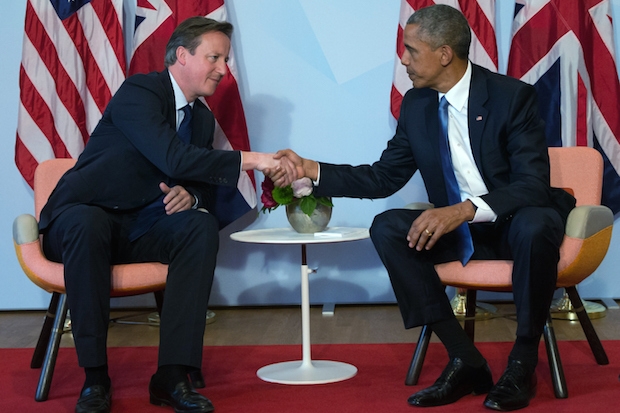My word, what a disgrace! What an outrage! Isn’t it deplorable that the President of the United States has the gall to offer an opinion on the merits of an argument that will have some significant impact on the future of one of the United States’ closest allies? The arrogance and sheer effrontery of the man!
Sheer piffle, of course, but it seems to be the case that those people who think the United Kingdom should leave the European Union are the tenderest, most easily-bruised, people in the realm. So it is unacceptable that Barack Obama should poke his nose into someone else’s business and suggest, in temperate terms, his country’s preference that Britain should remain a member of the EU.
Now Obama may be mistaken but that doesn’t deny him the right to express his government’s opinion. There is every difference between offering a view on a single-issue referendum and endorsing a given candidate in a normal general election.
People are such self-serving hypocrites, however. When Ronald Reagan snubbed Neil Kinnock, making it clear he thought Britain should re-elect Margaret Thatcher, Tories giggled with delight. What a jape! What leadership! What common-sense. Similarly, Bill Clinton’s preference that Tony Blair be elected in 1997 was hardly a secret. Nor was George W Bush’s enthusiasm for Blair’s re-election in 2005 hidden from the electorate. So, as usual, the propriety of such things is conditional upon your approval of the outcome sought. I’ll like it if it’s good for My Team and deplore it if it’s good for Your Team.
The fact of the matter is that almost all of Britain’s closest allies think that leaving the EU would be a daft and retrograde step in the wrong direction. Their analysis of their own interest leads them to want Britain to stay in. They also think, presumably genuinely, that this is also in Britain’s own best interests.
Now they may be mistaken and the case for Remain scarcely depends on the views of outside observers but it’s absurd to say Britain’s friends elsewhere have no stake at all in this argument. Since they have that stake, it seems reasonable for them to offer their opinion. You don’t have to agree with them for that to remain the case.
And, look, many of the people clutching their pearls in horror at the thought Obama might suggest an In vote is the more prudent course are the same people who chortled, nay celebrated, his observation that the United States preferred a strong and united United Kingdom. You cannot, at least not with any consistency or honesty, salute his intervention during the Scottish independence referendum campaign and now deplore his intervention in the EU referendum campaign. If one intervention was fine, so is the other.
Perhaps Obama should not have said anything about the Scottish vote either. But in that case the UK government should not, presumably, have spent quite so much time drumming up support for its position from foreign governments. In 2014, however, almost all of this country’s friends and allies hoped – with varying degrees of secrecy – for a No vote just as those same friends and allies now hope Britain will vote to remain a part of the EU.
This might, you may think, merely reflect a preference for known knowns. It may even be little more than orthodox establishment thinking. It may, as I say, be mistaken. But it might also be worth paying attention to. There is no requirement to do something just because the vast majority of your friends want you to do that something but their advice, as seen from their perspective, still seems something worth thinking about.
There is, of course, a perfectly respectable case for leaving. The EU is not the be all and end all of anything. Finding its weaknesses requires no great powers of detection. But so much of the case for leaving appears to be based on unicorn-farming that it is hard to take its promises seriously. Far less is it possible to be enthused by a campaign which appears to think, for real, that this is a struggle for “national liberation” and “freedom”.
You don’t have to be a crank to be an Outer but the Out campaign seems disproportionately stuffed with cranks. You know, the kinds of people who screech that people voting to Remain are nothing more than Vichy-style collaborators. One day, you’d hope, these people will be ashamed of this kind of talk but I wouldn’t want to wager too much money on that proposition. They might, however, want to reflect on the thought that careless talk costs votes.







Comments